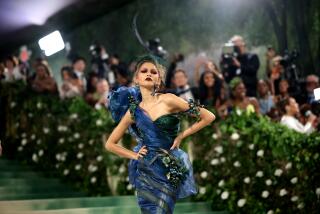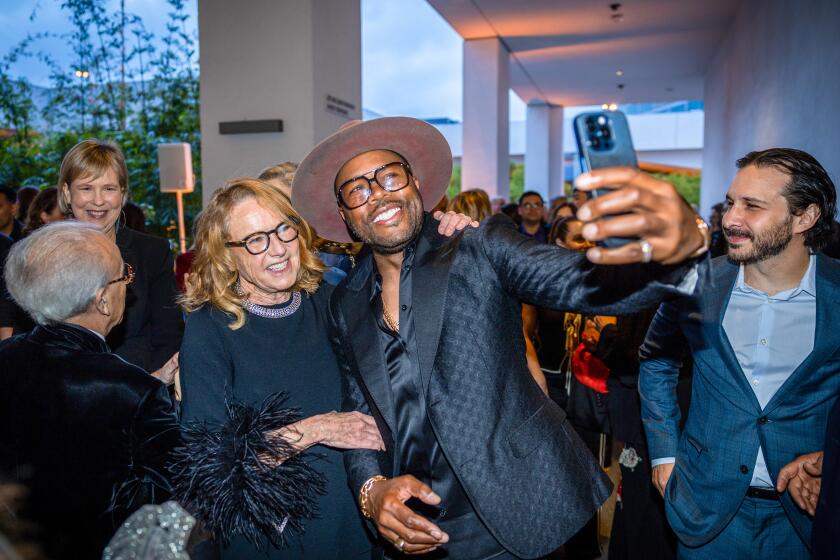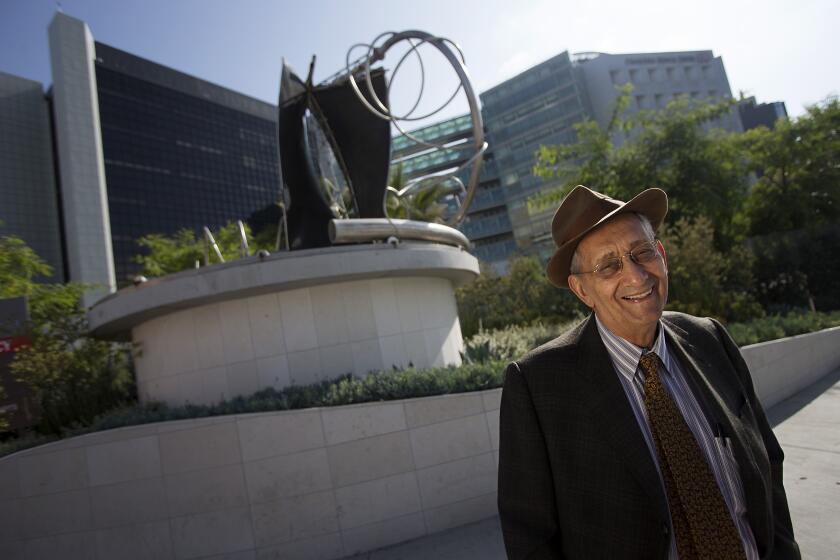IT TOOK LOTS OF BRASS TO STAGE FETE
Even a decade ago, a brass festival at San Diego State University would have meant a conclave of marching bands. For next week’s gathering of brass players, however, those spiffy uniforms and majorette batons will be conspicuous by their absence. Instead, a wide range of music, from jazz to esoteric chamber music for tuba quartet, will be offered in both concerts and workshops.
According to Brent Dutton, the SDSU music professor who is organizing the festival, the emphasis on jazz is congruent with the SDSU music department’s addition of jazz to its undergraduate curriculum. Chuck Findley, a Los Angeles-based jazz trumpeter, will be the featured soloist with the university jazz ensembles, directed by SDSU’s Bill Yeager, in the festival’s final concert next Saturday night in Smith Recital Hall.
Be-bop is the ascendant jazz style of the moment, according to Findley: “Ever since (trumpeter) Wynton Marsalis came on the scene, he’s brought be-bop back and also brought (trumpeter) Miles Davis back. It’s certainly not fusion you’re hearing today.”
A dense, rhythmically complex jazz style that developed in the late 1940s and flourished into the early 1960s, be-bop is the style Findley was raised on. He started studying classical trumpet at the Cleveland Institute of Music but after six months left school to go on the road with drummer Buddy Rich and his ensemble. Now that jazz has earned its academic credentials, Findley noted, an aspiring jazz player does not have to leave college to get his jazz chops.
Paradoxically, just as universities have geared their music programs to include performance of more varied musical styles, the opportunities for live performance appear to be shrinking on every front. The classically oriented player faces the demise of large symphony orchestras, and the commercial players face competition from electronic imitators, the synthesizers and emulators that make live performers redundant.
This fact is not lost on the more perceptive students, Dutton noted. “But if you want to be a performer, that sort of takes care of itself. An all-consuming need to perform is seldom deterred,” he said. “It was never a historically a smart move to become a musician if you wanted to make big bucks. I play tuba, which is a ridiculous thing to play, but I have a strong desire to perform on that instrument.
“We get to play the majority of the worst solo music, although perhaps the double bass may have a greater claim to that distinction.”
Dutton will attempt to disprove his own put down of solo tuba music in brass week’s opening recital Monday night. Going from the proverbial ridiculous to the sublime, he will begin with Rossini’s “Largo al factotum” for solo tuba and brass ensemble. “It’s an arrangement of Figaro’s big entrance aria,” Dutton said. “It’s quite funny--I’m enjoying that.”
At the more serious end of the spectrum, he will play his own trio for cello, double bass and tuba, “Evidently Occasional Music,” and Polish avant garde composer Krzysztof Penderecki’s 1980 “Capriccio” for solo tuba, which he described as an angular, gymnastic piece.
Tuesday’s Smith Hall program will feature trumpeter Alan Siebert in a solo recital of French and American classical trumpet repertory. Siebert is a member of the SDSU music faculty as well as assistant principal trumpet with the San Diego Symphony.
Among the brass ensembles playing Wednesday night are Dutton’s Pacific Tuba Quartet, the Clarion Trumpet Ensemble and the San Diego Brass Consort. Under the direction of Steve Foster, the four trumpeters of the Clarion ensemble have regularly opened performances of the San Diego Opera and the summer festival of the Old Globe Theatre with colorful fanfares composed by their bass trumpet player, Richard Gordon.
If the tuba quartet is not exactly a household word even among classical music aficionados, its relatively recent invention may help explain its obscurity.
“The Pacific Tuba Quartet performs everything it can,” said Dutton. “The literature was non-existent even in the 1950s, so all the music written is very new.”
Dutton admitted that the sheer novelty value of this type of group--a tuba quartet is composed of two euphoniums (tenor tubas) and two tubas--is enormous, but he has curbed his colleagues’ desires to indulge in Canadian Brass style antics and cute choreography. The quartet will perform a composition Dutton completed last year entitled “Resonances.”
Four different student ensembles will perform Thursday.
More to Read
The biggest entertainment stories
Get our big stories about Hollywood, film, television, music, arts, culture and more right in your inbox as soon as they publish.
You may occasionally receive promotional content from the Los Angeles Times.






